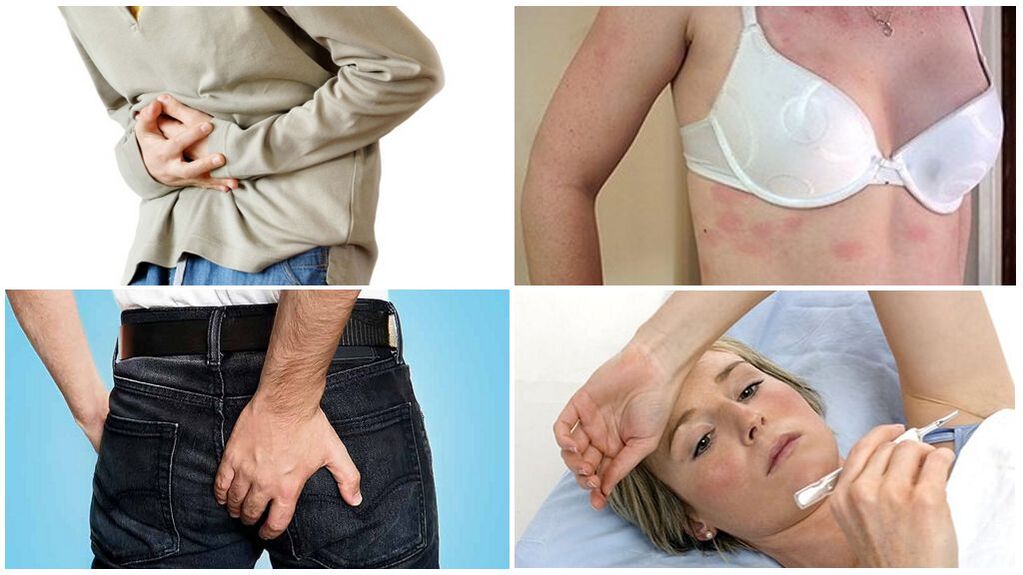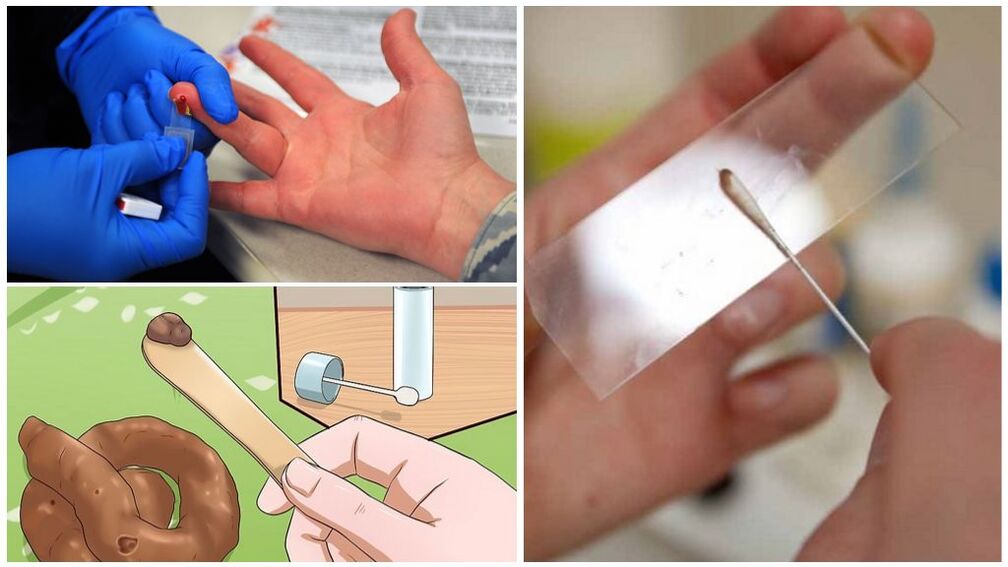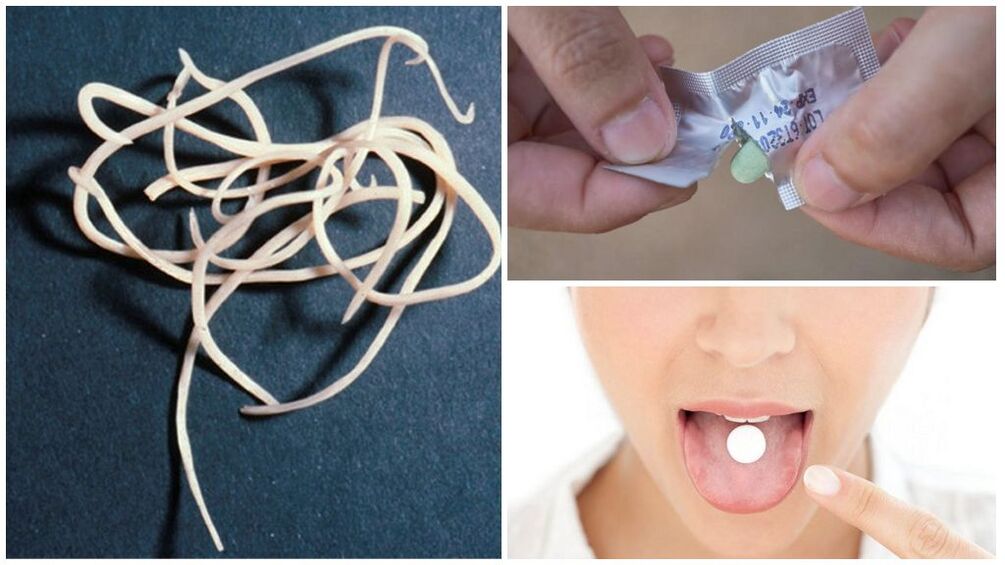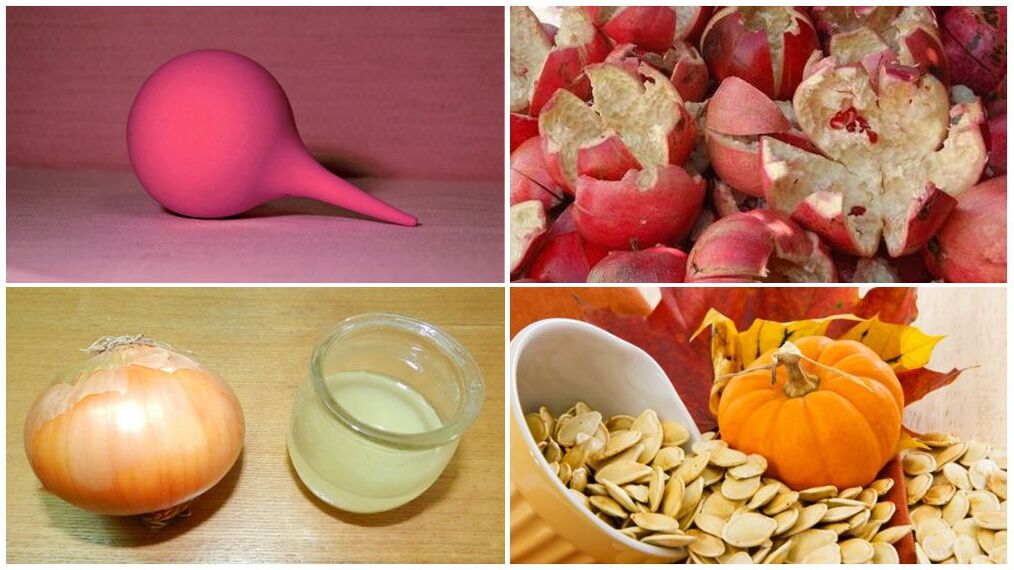Parasite infestations often go unnoticed. And the initial symptoms of intestinal worms in humans are not specific, so people who are sick do not go to the doctor for a long time. So the patient may think that he is overworked, has gastritis or poisoning, has an exacerbation of allergies or arthritis.
How to suspect the appearance of worms
The signs of helminthiasis in the body depend on the type and localization of the parasite. Some symptoms appear soon after infection. Others occur after some time and indicate migration of worms in the body, increased poisoning, lack of nutrients or vitamins.
The most common signs of intestinal worms in adults include:
- Increased body temperature. Fever can be expressed - up to 37, 5 ° C, short term. Episodes of temperature rise coincide with periods of deterioration, accompanied by an increase in various groups of lymph nodes.
- One of the most common signs of worms is an upset stomach. The sensation of discomfort has one specific localization - in the navel, liver or movement. The pain is accompanied by a violation of the stool, the appearance of feces in the stool - mucus, blood. More often there are attacks of diarrhea, but with obstruction of the intestinal lumen by parasites, the development of obstruction is also possible.
- Itching of the anus is the first sign and characteristic symptom of pinworms. It occurs at night, forcing a person to scratch the anus.
- Worms cause allergic skin reactions or respiratory types as a result of the circulation of their putrefactive products, toxins, in the body. So a person complains of exacerbation of bronchial asthma, the appearance of dermatitis, eczema.
- When infected with worms, beriberi develops. It manifests itself in the form of a deterioration in the condition of hair, nails, characteristic "jam" in the corners of the mouth, dry skin. Lack of iron in the body leads to the development of anemia, pale skin, the appearance of bruises under the eyes.
- Worms also have a pathogenic effect on the nervous system, as a result of which the patient is disturbed by headaches, irritability, impaired performance, intermittent sleep and emotional instability.
- Worms that migrate through the respiratory system (roundworms) cause a person to experience attacks of dry cough. With the movement of the parasite in the muscles, the development of poisoning, sick people complain of aches, sore muscles and joints.

On a note!
The first symptoms of infection can appear within a few days after the worm's penetration into the body of an adult. More often occurs after 2-3 weeks from the moment of contact with parasites, and with migrating worms - after months, years.
The combination of different symptoms does not clearly indicate a specific disease, but is a reason to worry about your health and see a doctor. If a sick person is self-diagnosing, seeking information on how to understand that you have worms, he risks losing time and getting life-threatening complications.
What is the danger of parasitic infection?
Worms in the body take not only the necessary nutrients and vitamins from a person. Worms poison the patient with the products of putrefaction, affect the internal organs. Parasitic worms in humans can cause serious illness that requires immediate surgery, and in some cases with partial organ removal:
- acute intestinal obstruction;
- violation of the integrity of the intestine with the development of peritonitis;
- appendicitis;
- blockage of the bile ducts;
- eye damage.
Important!
Among the delayed consequences of the invasion, which leads to a deterioration in the condition, the death of the patient, are cirrhosis and liver cancer, pneumonia, pleurisy, sclerosis of lung tissue, myocarditis, meningitis, hearing and vision impairment, episyndrome.
How do worm infestations occur?
To solve the problem of preventing worms, it is necessary to have information about where the parasites come from. The most common mechanisms of infection include: gastrointestinal, household-contact, percutaneous, infectious (associated with blood-sucking insects).

Here are the most common situations in which worms appear in the body:
- Use of vegetables, fruits, berries or vegetables contaminated with parasitic eggs.
- Eating poorly cooked meat, fish with worm larvae. Feeding games that have not passed veterinary control. So Trichinella can withstand prolonged boiling of meat and maintain its viability.
- Violation of hygiene rules: a formal attitude to washing hands after returning from the road, contact with pets or street animals.
- Bathe in a reservoir containing worm larvae.
- Contact with soil containing parasitic larvae while working in the garden.
- Work in conditions where there is an increased risk of helminth infection: in children's groups, food, livestock, poultry farming.
Where are worms found in the human body?
There are many medical myths about where worms live in the human body. Not all of them are based on parasitological data. Some worms occupy different parts of the intestine and reproduce in it. Humans can be the main host of the parasite. The so-called human worms pass through the stage of sexual reproduction in the body, then come out with feces. In the case of animal worms, a person is an intermediate host, in which only the asexual (parthenogenetic) phase is possible. The parasite spreads to the internal organs, causing damage to them. So worms in the human body can be detected:
- under the skin;
- in the heart;
- in the bladder;
- In the eyes;
- in muscles;
- in the lungs and heart;
- in the brain.
If we consider the description of the life cycle of the worm in the form of a photo with explanations, we can trace its migration through the body and guess what the main symptoms of the disease will be.
Worm diagnosis
The appearance of abdominal pain, fever, skin rash, cough with phlegm, inflammatory and allergic changes in the blood picture is the basis for examining a person for parasites. Infection recommends laboratory tests to detect worms or an immune response to their presence in the body.

The following methods help identify worms in a person:
- stool analysis for parasite eggs;
- scraping or smearing enterobiasis;
- immunological tests to detect antibodies to helminths;
- PCR analysis for worm DNA fragments;
- detection of worms in duodenal contents, tissue biopsy specimens.
These methods will help to identify the type of parasite and choose an effective remedy. If the internal organs are damaged, the following will help diagnose worms:
- chest x-ray;
- Ultrasound of the liver, heart, pancreas;
- cystoscopy;
- Brain MRI.
If necessary, an infectious disease specialist will refer a neurologist, ophthalmologist, cardiologist, urologist for consultation.
On a note!
You should not try to identify the worm yourself, use "unique computer diagnostics" outside a medical institution. This will lead to a loss of time, a decrease in health.
Treatment of worms in humans
If a disease is detected, the infectious disease specialist will provide complete recommendations on disease treatment, regimen, and diet. If necessary, the doctor will recommend hospitalization. There is no single "magic" cure for worms, symptoms and treatment of worms in adults can vary.
You need to know the basic principles of parasite therapy:
- To combat worms, drugs are used. The choice of the treatment regimen (dose, duration of the course, frequency of administration) depends on the type of worms, the state of the body of the sick person.
- In cases of severe disease, assistance is provided in the hospital.
- You should not independently reduce the dose, reduce the duration of treatment with tablets or suspensions from worms.
- Some drugs require diet, refusal to drink alcohol.
- There is no "magic" cure that will allow you to get rid of worms quickly in 1 day. For the treatment of some helminths in humans, short courses are indeed used, but it is impossible to destroy all the parasites in the body with one tablet, tincture or ointment.
- Herbal preparations are used in sick people who, for health reasons, are contraindicated in medicine in the form of tablets or suspensions.
- Antiallergic drugs, hepatoprotectors, enterosorbents, immunomodulators are prescribed as adjunctive therapy. On their own, they do not help to get rid of worms from a person, but improve the general well-being of a person, eliminate unpleasant symptoms of the disease and side effects of treatment.

Important!
Traditional medicine is used only as an additional method of therapy. The independent use of alternative medicine is fraught with setbacks.
pharmacy fund
Treatment with drugs from the group of anthelmintic drugs helps to destroy, expel parasites from the body. Pharmaceutical drugs have different application points:
- interfere with the absorption of nutrients by the parasite;
- interfere with the metabolism of worms;
- causes paralysis of the worm's muscles.
On a note!
With proper use and prevention of helminthiasis in the future, deworming helps to permanently rid a person of parasites that have settled in the intestines and internal organs. But if the patient neglects the basic rules of hygiene, reinfection with parasites is possible.
Also, infectious disease specialists can prescribe herbal remedies that help to poison and expel worms in humans. The doctor will recommend certain herbs, based on information about the state of the body and the type of parasite. To cure the patient, apply: pumpkin seeds, tansy grass and centaury.
Traditional medicine for worms
Many patients refuse traditional therapeutic methods, hoping for help from traditional medicine. Infectionists warn that attempts to get rid of worms at home with dubious solutions, infusions can lead to increased poisoning, allergic reactions. If you miss the time, the disease will progress, a fatal outcome is possible.

To expel worms from the body, the following home remedies are widely used:
- onion stew;
- pomegranate peel;
- enemas and consumption of pumpkin seeds;
- juices from sour vegetables and fruits without sugar;
- garlic with milk;
- soda enemas;
- tincture of wormwood.
Treatment Reviews
Before starting therapy, the patient considers various options for dealing with parasites, trying to understand how to properly poison the worms. In their reviews, people who have experienced worm invasion describe traditional drug therapy as a fairly effective method. It is very rare to get rid of worms with folk remedies.
- "I'm starting to worry about anal itching. Have addressed the therapist, have received directions on scraping. It is very unpleasant that pinworms are found in the scratch. I read how dangerous worms are, and decided not to poison myself with self-medication. Topthe doctor advised, he took anthelmintic drugs - 1 tablet 1 time a week. The course took 2 weeks, I immediately felt relief, the itching disappeared. I believe that it is not a terrible infection, but the drug works "very well. "
- "I got worms after eating fish at a party. Immediately diarrhea started. I lost weight, my skin became dry and itchy. I studied detailed information about how to treat parasites and how to recover later, I started taking anthelmintic drugs myself. Iembarrassed to go to the doctor. The medicine did not help. I tried to fight worms by traditional methods: I did a cleansing of the liver with bitterness, drank milk with garlic and put enemas. But it did not get better. I had to turn to an infectious disease specialist, I was treated with anthelmintic drugs of the benzimidazole class. When I was "ripe" to go to the doctor, I lost 4 kilograms, became pale, nervous.
Prevention
Knowing how worms appear in the body, anyone can protect themselves and their loved ones from infection. Prevention includes:
- Wash hands with soap after contact with animals, go home.
- Deworming regularly for pets.
- Timely change of bed linen.
- Regular wet cleaning, airing, cleaning of carpets and upholstered furniture.
- Eat meat that has passed veterinary control.
- Thorough heat treatment of meat and fish.
- Refusal to eat raw meat, fish, offal.
Worm infections require immediate treatment. You should pay attention to symptoms such as: diarrhea, abdominal pain, loss of appetite, weight loss, skin rash, cough, fever and consult a specialist immediately. After treatment, precautions should be taken to prevent reinfection.
















































